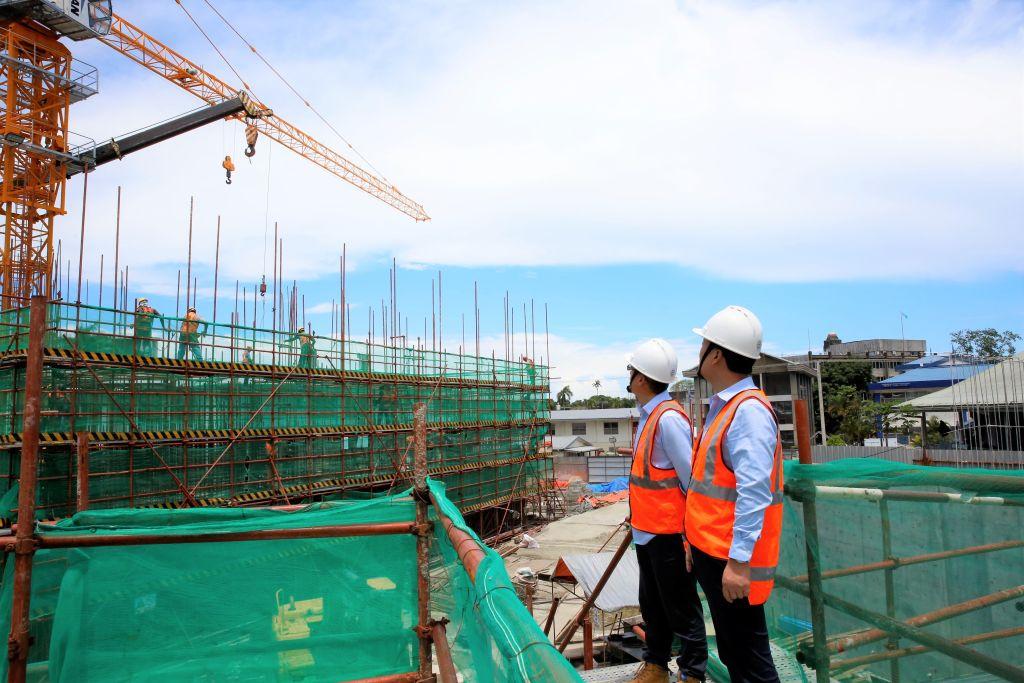Building resilience to economic coercion in Indo-Pacific island states
Posted By Richard Herr on September 30, 2021 @ 09:00

The dramatic creation of AUKUS [1] has focused attention on the military response to China’s increasing capacity to project force across the Indo-Pacific. The furore it sparked, highlighted by the predictably strong Chinese claims [2] of retaliation, has fixated global attention on hard power and the prospects of a new cold war.
Yet, economic rather than military might poses the gravest threat to the Indo-Pacific island states. President Xi Jinping is aggressively using China’s growing economic power to achieve political aims, and that is proving much easier than physical intervention.
The rapid expansion of China’s navy and its increasingly global reach have raised concerns for the island countries of the Indian and Pacific Oceans as targets for geopolitical influence. While not intrinsically militarily significant, islands in these oceans have for centuries enabled other states to project power over the seas around them.
Given their potential strategic significance, these islands have been portrayed as soft targets for Chinese economic coercion with serious security and economic consequences for the democratic states of the Indo-Pacific such as the Quad nations.
A new ASPI special report, Economic coercion in Indo-Pacific island states: building resilience [3], co-written by me and David Brewster, finds that levels of such economic coercion may be more or less than is supposed, depending on the perspective of the observer.
There are significant differences between island countries of the Indian Ocean and the much smaller ones of the Pacific Ocean, but they do share some common vulnerabilities that heighten their sensitivity to economic coercion.
Insularity exposes their supply chains to ready disruption, both natural and political. All are developing states highly dependent on external capital and aid to advance their economies. Their small size coupled with state-dependent, rather than private-sector-driven, domestic economies vests significant control in narrow elites.
Many of these same conditions tend to make it more difficult to identify instances of economic coercion.
The matrix of economic coercion embodies two distinct elements. One axis in the matrix concerns the state’s volition and its interest. Basically, does the state act unwillingly contrary to its own interests?
The second axis concerns the level of pressure or duress used to compel compliance. Duress involves using any combination of overt intimidation, threats and naked physical power to achieve compliance. However, there are forms of ‘undue pressure’ that don’t quite rise to the level of duress.
Given the asymmetries involved, economic and political, China has rarely had to resort to the overt duress to impose coercive economic pressure on the island states of the Indo-Pacific that it has exerted against [4] much larger nations such as Norway, Japan and Australia.
These might be regarded as proxy economic wars in a larger campaign to rewrite international trade rules. Nevertheless, they may also serve to intimidate smaller states.
Supporters of Australia’s resistance to economic coercion argue that the failure of such overt coercion can send the opposite message [5].
Our report identifies some examples of duress against Indo-Pacific island states such as the choking of Palau’s tourism. However, duress is rarely openly or nakedly applied.
Economic coercion of those states is rare for several reasons.
One key explanation derives from the agency these countries have in entering into economic arrangements that outside observers regard as contrary to the target country’s better interest. Criticisms [6] of ‘roads to nowhere’, overpriced buildings ill-suited to tropical conditions and agreements for unaffordable loans are rejected not so much because they lack substance but because they impugn local decision-making.
In the words of former Samoan Prime Minister Tuilaepa Sailele Malielegaoi, the criticisms question [7] the ‘wisdom and intelligence of the leaders of the Pacific Islands’ who know the interests of their countries better than those who make the complaints.
Similar defences are made of island leaders’ willingness to enter into agreements with China that outsiders deem unwise. Where is the coercion if contracts for the projects requested and the loans to finance them are signed willingly?
Of course, the critics respond, coercive pressure isn’t needed when the decision-making elites are in the pockets of the Chinese. Elite capture can account for corrupt decisions against the target nation’s own interests.
In the end, the grey area of undue pressure—whispered threats, secret promises, manufactured local lobby groups—involves so many different tactics that it’s impossible to prove that economic levers have been pulled to force a favourable outcome for Beijing.
The report also finds that national processes to prevent economic coercion are often neutralised to keep concerns from becoming public. Well-resourced counter-messaging campaigns, favourable agreements with local media, a vocal diaspora and the like can silence local criticism or prevent the exposure of corruption.
Given all the challenges to identifying and exposing economic coercion, the report concludes that building resilience may be difficult but is necessary.
Suggested measures include:
- developing codes of economic conduct to better identify and limit unacceptable economic duress
- strengthening government and economic integrity institutions
- equipping and mobilising island businesses to better protect themselves against the pernicious effects of external economic coercion
- promoting strong independent media and civil society organisations to enhance transparency and promote the values of an open society.
Cooperating with the Indo-Pacific island states to build this resilience doesn’t depend on validating the extent of economic coercion. To do that would delay any action. And our report shows that finding such proof would be very difficult.
But the suggested measures can strengthen these states against coercion, serve as a prophylactic against the future use of economic duress and, in general, contribute to achieving a free and open Indo-Pacific.
Article printed from The Strategist: https://aspistrategist.ru
URL to article: /building-resilience-to-economic-coercion-in-indo-pacific-island-states/
URLs in this post:
[1] AUKUS: https://www.theguardian.com/australia-news/2021/sep/15/australia-nuclear-powered-submarines-us-uk-security-partnership-aukus
[2] Chinese claims: https://www.globaltimes.cn/page/202109/1234459.shtml
[3] Economic coercion in Indo-Pacific island states: building resilience: https://www.aspistrategist.ru/report/economic-coercion-indo-pacific-island-states-building-resilience
[4] exerted against: https://www.csis.org/analysis/time-collective-pushback-against-chinas-economic-coercion
[5] opposite message: https://rusi.org/explore-our-research/publications/commentary/australias-answer-chinas-coercive-challenge
[6] Criticisms: https://www.abc.net.au/news/2018-01-10/australia-hits-out-at-chinese-aid-to-pacific/9316732
[7] the criticisms question: https://www.abc.net.au/news/2018-01-12/samoan-prime-minister-hits-back-at-insulting-china-aid-comments/9323420
Click here to print.